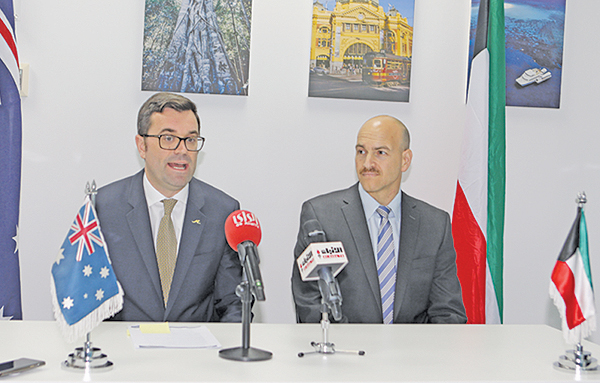Australian exporting company violated animal welfare conditions: Ambassador

KUWAIT: After a few months of suspension during summer, live sheep shipments to Kuwait have resumed, the Australian ambassador to Kuwait announced during a roundtable with local reporters on Thursday. Ambassador Jonathan Gilbert said the demand for Australian beef and lamb continues to grow and Australia is committed to fulfill the demand. "We want you to know that it was not the Kuwaiti side that violated animal welfare conditions - it was the Australian exporting company, which subsequently lost its license to operate," said Gilbert.
"During the suspension, we worked hard to place additional measures to strengthen the regulations and we are back to normal now. We are now working with the new company to comply fully with the government's standards and regulations, especially regarding animal welfare. We place independent observers too to make sure we are complying with the regulations; they are tasked to monitor the live sheep shipments," he said, adding total food and agricultural exports in 2017-18 was around $300 million.
Gilbert noted that despite the absence of live Australian sheep, large volumes of chilled Australian beef and lamb are still coming in from Australia. "Just one local company in Salmiya sells more than 20 tons of Australian beef every month. The demand is really huge for Australian meat," he said.
At the same roundtable, Gilbert introduced Dr Neil Lazarow, Research Group Leader - Land and Water at the Commonwealth Scientific and Industrial Research Organization (CSIRO). CSIRO is Australia's national science agency and one of the largest and most diverse research agencies in the world. "In October, CSIRO signed a memorandum of understanding with Kuwait Institute for Scientific Research (KISR). Dr Lazarow is visiting Kuwait at the invitation of KISR for talks on the effects of extreme weather events on infrastructure and possible scientific solutions," Gilbert noted.
He told reporters that Lazarow's visit comes at a very relevant time in Kuwait - after the recent heavy rainfall and volatile weather. "Australia like Kuwait has seen an increase in extreme weather events in recent years - storms and flooding have sadly caused considerable damage to infrastructure and loss of life," he said. KISR's seminar raised a number of important questions faced by both Australia and Kuwait, including: How do you improve preparedness for and recovery from extreme events? How do you better predict extreme weather? How can you build infrastructure so that it can better withstand extreme weather events?
On science and technology, Australia and Kuwaiti have a lot to learn from each other. "I look forward to seeing further exchanges of CSIRO and KISR scientists. Australia is a natural partner of Kuwait with regards to a number of areas including water management, renewable energy, dry land agriculture and aquaculture. We have world-leading expertise and technologies in these areas that I encourage Kuwait to look at closely, especially as it embarks on the implementation of its New Kuwait 2035 vision. Australia and Kuwait continue to have a close defense relationship underpinned by our involvement in the coalition during the 1991 liberation of Kuwait and current cooperation in the international coalition to defeat IS. We have a shared commitment to promote regional security and cooperation," Gilbert said.
On investment, Gilbert said that Australia continues to see strong Kuwaiti interest in Australia given its world-beating economy, strong governance, strategic location in the Asia-Pacific and world-class infrastructure. "Large Kuwaiti investments in the oil and gas sector in Australia as well as energy infrastructure and real estate are generating good returns for Kuwaiti investors," he said. On education, there are just under a 1,000 Kuwaiti students studying in Australia. "We hope this can grow further given the positive experiences of young Kuwaitis who chose Australia because of its high quality universities and friendly and safe multicultural cities," he added.
By Ben Garcia








